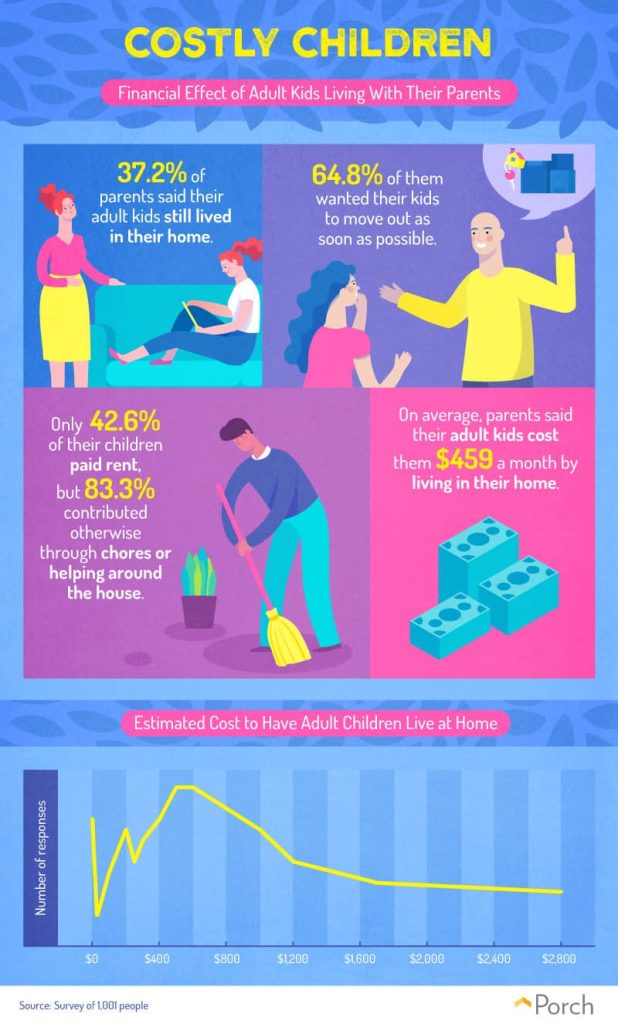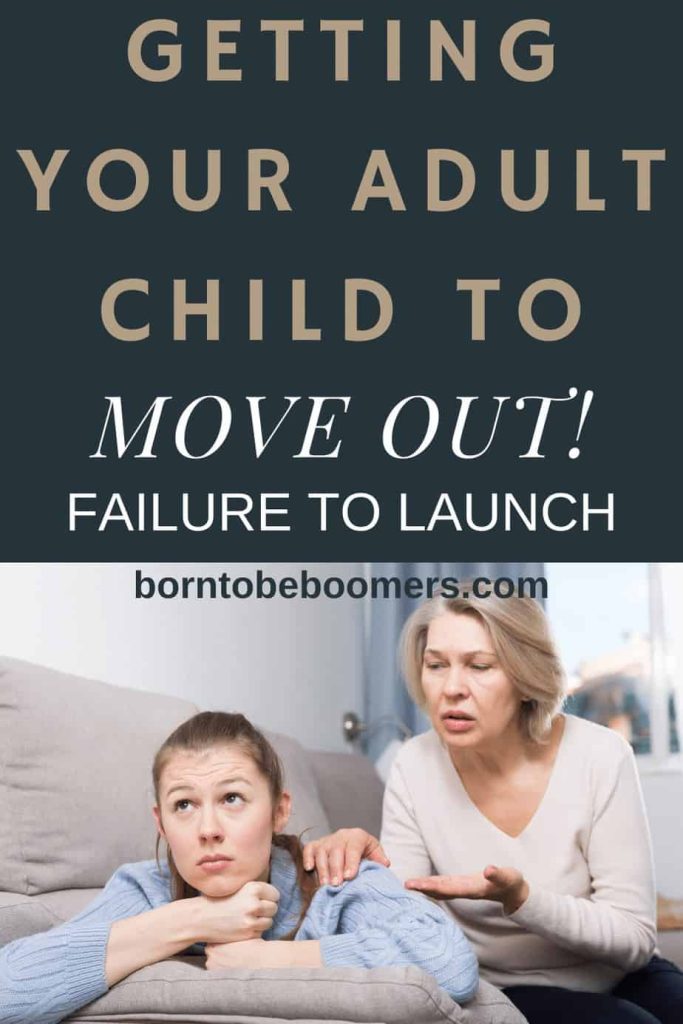Are you dealing with Failure to Launch with adult children still living in your home who refuse to move out? Do you long for the day when you can downsize your home to a condo in Florida, maybe become an Ex-Pat, or travel the world? Failure to Launch is on the rise, and you need a real plan if your child is too comfortable at home.
A rising number of young adults struggle to find their way in the world and leave the nest. Some parents enjoy having their adult children home while others are looking to start their next journey … alone. Failure to launch, or entitled dependency syndrome, has become a real problem for parents. Setting boundaries and taking responsibility for your situation will be the first steps to getting your children to leave.
Table of Contents
What Is Entitled Dependence Syndrome?
This is a term coined in 2008 by Haim Omer. It essentially refers to adult children who are unwilling to separate from their parents and remain dependent, even though they are physically and emotionally capable of working and surviving independently. They are typically underemployed and would prefer to keep it that way. Their parents enable this behavior by maintaining a lifestyle for the child that is better than what they are willing to do for themselves.
Some kids living this way may drive much nicer cars or live a party lifestyle because they do not have to pay rent and the other bills that their independent peers do. Some do nothing at all. Whatever the payoff, it is increasing here in the US, and many parents are at a loss as to what to do about it.
When Should Your Adult Child Move Out?
For most families, children are told that as long as they are in school, they do not have to pay rent or receive some support from their parents. If they are working, then many parents accept a contribution from their adult children, even if it is not needed, to give a sense of accountability to a young adult.
In other words, 18, or when your child graduates from high school, is a good starting point. Many parents will allow their children to stay if they attend college to help ease financial burdens.
See: MIDLIFE CRISIS: CREATING THE CHANGE YOU NEED TO MAKE!
Reasons To Ask Your Child To Move Out
Three are many reasons you may want to ask your adult child to move out that are both beneficial to you and your child.
Benefits to you:
- Lower your food costs
- Lower your utilities
- Freedom to downsize
- Enter into the Empty Nest or Retirement phase of life
- Rent out their room for extra income
Benefits to the child:
- A sense of accomplishment
- Encouraging financial independence
- Learn to live within their means
- A little bit of sacrifice never hurt anyone. The struggle can actually build character.
Young adults who live with their parents tend to fare worse in the labor market and have lower incomes. According to 2018 data from the U.S. Census Bureau, the unemployment rate of young adults aged 25-34 who live with their parents was 10 percent, nearly double the 5.1 percent unemployment rate of all young adults aged 25-34.
The median personal income of young adults living with their parents—$20,000 in 2018—was 33 percent lower than the median personal income among all young adults and 41 percent lower than that of all adults aged 25-64.
According to a study by Porch, parents who allow their children to live at home will feel a difference in their income of about $459 per month.

When Is It Okay For Your Child to Live With You
This is really an individual choice for many. Many parents truly do not mind helping their kids get on their feet while working internships and entry-level positions that may not pay enough to afford rent in higher cost of living areas.
Parents will often make this concession for their children to ensure that they are closer to home and not going into great debt amounts. That really is not the same as Failure to Launch.
If they are still living with you after the age of 25, you should be concerned.
If you find you are putting off your plans for the future to make things easier on your child, it may be time to have a conversation about how children can make a living on their own be a priority for them.
Getting Your Children To Move On and Out!
Setting goals is a great way to get an entitled adult child to prepare themselves emotionally for the move. It is not really fair when you have been enabling them, to kick them out immediately, with no plan in place.
It will always start with an initial conversation. I was reminiscing with my daughter about this the other day. She had no problem moving into one of my rental properties then getting a reduced rent when a roommate situation had not worked out.
I had actually asked her to move back in with us to get fair market value for the apartment. And she could pay what she was paying and rent a room from us. She declared she needed to stay in our rental property to be independent. I would retort, but you are not independent because I am not getting all of the rent!
She is now married, with a great career, and a homeowner. But this is an example of someone who was not feeling the pain or pressure of being financially independent at 21. She might have looked independent to an outsider, but it was on our dime.
Eventually, she got a roommate, and I eventually started getting all of the rent, but the struggle was real, and it took several conversations. Today, she is better off for it. She worked harder and got there faster because the pressure was on.
The important thing to remember is that it is your right to have your child be financially independent and out of your home by 18. Hopefully, you told them that this is the way of the world before they were 18, at least here in the US. It could be younger if they live somewhere else.
See: NOT HAPPY? 11 DAILY HABITS OF JOYOUS PEOPLE
10 Steps To Freedom
- Have a formal conversation – Adress the need for your child to move on.
- Make a list of your reasons that you need the child to move.
- Evaluate the situation – Work on a budget. Know where your adult child stands financially. Come up with a plan together.
- Document any verbal agreements, so there are no misunderstandings.
- Make sure you are not making excuses for your child.
- Have weekly progress check-ins to make sure the child is staying on track.
- Set firm deadlines of 15, 30, and 60 days – Job, second job, find an apartment or room to rent.
- Start visualizing and talking about your child moving out and living on their own.
- Enforce those deadlines – If they do not move, they pay the agreed-upon amount to stay. Move forward with your plans.
- If you do not want them to stay, you will have to be prepared to evict them if they refuse to leave.
Some parents will opt to split or to pay the first month’s rent and deposit for their child to get a solid head start. It can take more time for people to come up with that much cash in one lump sum.
Eviction may sound harsh to some, but if your child refuses to leave, it will be your only option if you are okay with making your child move, no matter the situation. Under the law, you are required to formally evict them, even if they are your child.

What If You Can Not Kick Them Out?
This is a difficult decision for any parent. Many will cave at the thought of their child living on the street. But, I can tell you what they do not need while living in your home rent-free.
- Video Games
- Cable and Internet
- Meals cooked
- Free laundry
- Bedroom and bathroom cleaned
- Food, snacks, and alcohol
- Coming home at all hours of the night
- Borrowing a car
The End Result
Once the parent’s wallet is closed, it is amazing what the adult child is capable of. It will be your child’s responsibility to get on public assistance if necessary and find the resources they need to survive.
They are basically calling your bluff, and if you do nothing, they will never leave. This may cause tension between you and your child. But you have to remember this is truly what is best for them.
Pin it for later!






59 responses to “How To Get Your Adult Child To Move Out: Failure To Launch”
My wife, and I recently allowed my wife’s 25 year old daughter to move in with us. She was living a long ways away from us and the rest of the family. To make this short… It quickly became a nightmare. She wouldn’t leave and because she receives mail here she has established residency. She moved out, but she still has mail coming here. How can I convince her to change her address and will that stop her claim of residency? I’m worried she will return. I am hoping to avoid the expensive costs of eviction.
The title reminds me of the SJP movie.
Thanks!
Great article. We have one adult child living with us and one living on her own. We were on track to have her leave the nest at one point, until she became a single mom. We love having our grandson here, but hopefully they can eventually get a place of their own.
I bet that is a tough decision. But even living together you can make sure to have strong boundaries.
Great article! I am going to print and post around my house. LOL, just kidding. My kiddos are not there yet but have already had these conversations. My sister in law is in her 50’s and still lives with my mother in law. She has only worked part-time dead-end jobs and is in for w rude awakening when my mother in law dies. When my husband and I got married we had a deal she would never come live with us.
Too funny! That is one way to get the message out loud and clear! WOW! I could not imagine living with a child who is 50. I think someone is going to be stuck with her! I glad to hear you have a prearranged contract with hubby! lol
Such an interesting and informative post. Understood the benefits for the children too, having never really being clear about that before. Thank you.
Thanks Maya!
I never had this issue although I have friends who have! One finally sold the family home, after her husband died, and bought a small condo with only one bedroom. That forced her adult son to find his own place.
LOL I have heard of people doing that before. Selling is a great way to set a deadline.
This was an interesting post about getting your adult child to move out. Our son graduated from college a year ago and is ready to launch (more so than me). And he does have an exit plan. Grateful to find a job in his field especially during a pandemic, he’s saving his money and contributing to household expenses so for right now, it’s all good. I’m enjoying these last few months with him living at home while I can.
When kids have a plan and are self-sufficient, parents are not as quick to want them to move!
These are great tips. My children at young (4 children 8 and under), so I don’t have to worry about this for a while. But we are actually planning a generational home so they have the option of staying if they so desire.
That is awesome! There is nothing wrong with wanting your kids to stay.
No failure to launch here. My girls want to fly the coop and I’m begging them to stay and save money.
I hear you! I wanted my daughter to save and stay home. They can own something so much faster if they stash that money away!
Interesting article! We used to always joke with our kids (and still do for the littles) that they will get a brand new set of luggage for their 25th birthdays. The luggage will be packed and on the porch waiting for them! LOL. In all seriousness though… we have always encouraged the kids to move out when they can, even with friends, to help them develop a sense of responsibility and independence. My two older kids have actually done that (ages 22 and 23) – ahead of schedule! They are doing well, and even though it may be hard at times, its a great lesson to learn. I had my own apartment just before I turned 19!
There are great lessons in moving out. My daughter said she learned so much. It really changed her perspective.
I went home to my parents for all of two weeks after college. I couldn’t wait to scram! That house still gives me nightmares to this day. In spite of my difficult life with them, I’m grateful for the education they gave me.
That is a great attitude to have. Focus on the important lessons and move forward.
All I can say is that, when I was a kid, I couldn’t WAIT to get out on my own. Not because it was uncomfortable; just because I wanted to be independent.
Thankfully, my 2 daughters were the same. Of course, like the advice you give, I didn’t make it all that comfortable for them to stay!
What’s that quote – something about, “We give them strong roots so they have wings to fly,” – something like that.
My younger daughter went through a rough patch where she flunked out of University. I told her she could stay at home with us for no charge as long as she was working and saving money – and paid off her college debts. She didn’t have much freedom. After about 3 months of working retail, she realized that she definitely wanted a degree, paid off her debts, and graduated.
Kids must be held responsible. 👍
Absolutely! That is an awesome story. She really learned and overcame!
Our son left home at 18 and had to return. He paid rent. When he turned 24 we let him know he needed to be out by 25. He was out in 6 months and we gave him his rent money back to help with deposits.
I love that idea. What a great way to help!
I guess I’m lucky, all three girls launched successfully after college. I’m sure it can be difficult for some.
Congrats!
This is great info. I didn’t know it could cost roughly $450/month to have your adult child living at home with you! Sheesh. Here in So Cal, a lot of homes have multi-generational families because it’s costly to live. My husband and I both stayed home through college because we went to schools that were local and it didn’t make sense to pay to live on campus when we were less than 20 minutes away. But as soon as we got our first jobs we moved out. We own a home now, but we live on a block with 9 other houses. And of those, half have their adult children living with them. I feel like it’s gaining in popularity. Sigh.
Well California is VERY expensive. I am not sure how people with lower incomes could make it without multiple people living together. With that being said, Cali was one of the top states where kids have to live at home as adults due to high rents.
This is a great post! I attribute so much of my adult success to moving out when I turned 18 and I hope that for my kids one day!
My daughter says the same thing. She is very responsible and says moving out early changed her mindset.
I can’t even imagine! But I have a good friend dealing with this, and I just shared your post with him!
Awesome! I hope it helps. Thank you.
I wish there was a nice way to send this to my in-laws. We are worried what will happen to my husband’s almost 40yr old brother when they can no longer take care of him.
I have a friend with a 40 something brother living with her mother. It will be interesting to see how they transition!
As I’m reading this, Step Brothers is currently playing in the background 😹
Lots of great info.
LOL Great movie! It really captures the immature adult child living at home!
My 24 year old still lives at home as she is finishing her masters. Both parties are quite ready to move onto the next phase of our lives.
Well, graduate school is costly. What a lovely gift you are giving her by allowing her to stay home during this time.
I don’t have kids, but will definitely remember this if I do because I know I’ll want them out 😂
Haha! Most start thinking about it during the terrible 2s!
My children are 5, and twin’s at 2….I dream about the day I can kick them out. Lol just kidding! This was a very informative article and I reflected heavily on my own leaving of the nest while reading it.
LOL Thank you for the chuckle!
This certainly has to always start with a good conversation – we specially built our home to ensure our kids had a place to stay because the world can be a crazy place. Of course, one day I wanna move but until they are settled in the real world, they will be welcome!
That is awesome!
I think it is so important to teach our kids to be adults and be responsible citizens. Learn to work hard and do hard things!
Struggle definitely builds character!
This was an interesting read! Back when I was graduating high school, it seemed like we couldn’t wait to move out of the house and find our way in the world. Back then, I wouldn’t have dreamed of living with my parents, especially after graduating college. Things seem very different today!
Yes. I think wages not keeping up with rents is a real issue for some. But at the same time, parents are also much more permissive. So it is easy to stay in the family home.
Very wise thoughts in here! Im sure it can be hard to force a child to move out, but it really needs to be done for the sake of the parents and the kids!
There are many life lessons in struggling a little bit to make things happen.
Great blog. I found helping them to learning how to budget and save goes a long way to helping them gain confidence and the means to move out. Also, a little tough love. Thanks for sharing.
Thank you Sabrina! Financial education may be a big part of the issue.
I can see this would be very difficult. Thankfully, that wasn’t something we had to push. My kids liked working and freedom I guess. Haha
And they are better for it!
You make great points on this! I know lots of countries have multi-generational families in a single home…where everyone helps and participates in running the home. Unfortunately, I know that’s not (always) what it looks like here. Self-sufficiency is, as you said, so important for building character and independence!
Exactly, it is a different story when the kids are working to support elderly family members.
We were fortunate that our adult children moved out by the time they were 21. They had a set agenda and worked hard to achieve.
I love it! Goal setting is an important part of growing up.